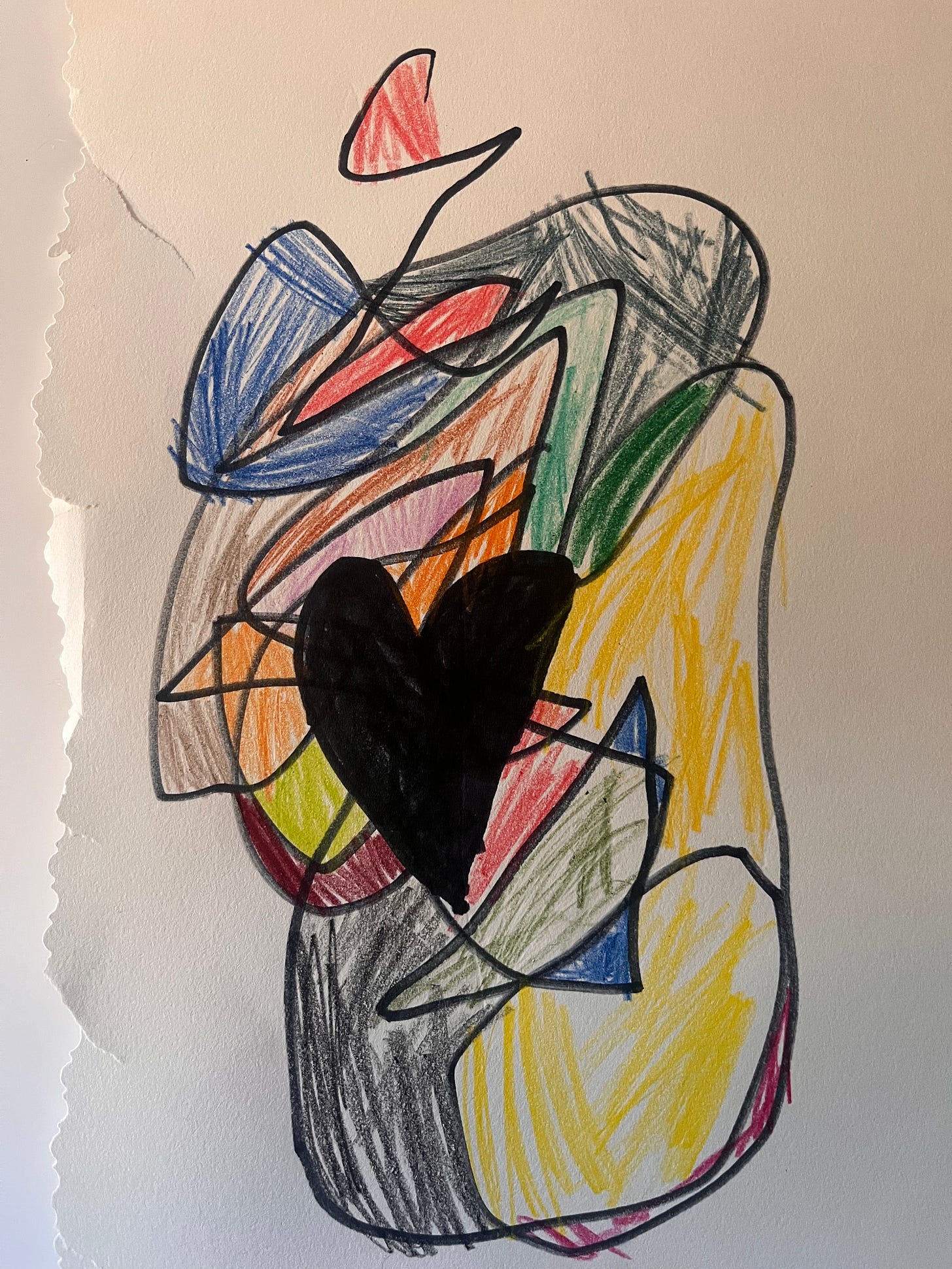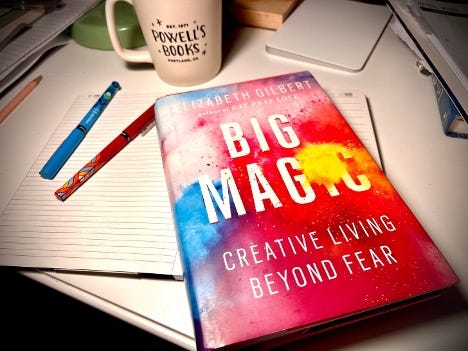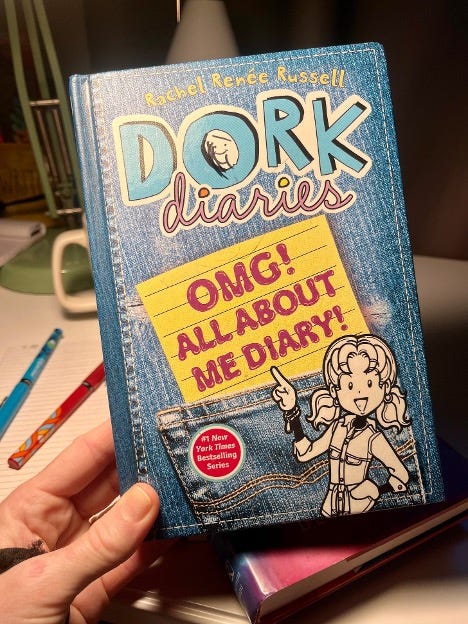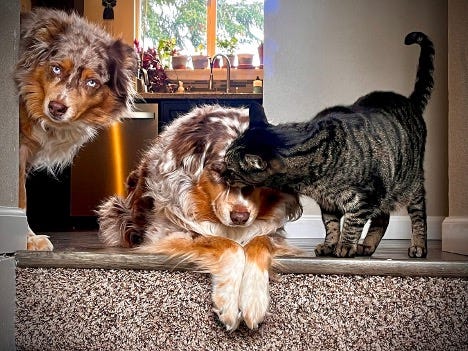At 41, I’ve lived most of my life without my mom. She passed away when I was 11, and last week, on the anniversary of her death, I realized that it’s now been 30 years without her. Somehow, knowing it had been three decades—and that I’ve lived three-quarters of my life with her absent—was particularly devastating. Now, as a mom myself, I can’t help but think about all the moments we missed out on.
But she gave me one precious gift that I will always have.
My mother gifted me with writing. With the permission to write, which I’ve learned so many people—especially busy moms who feel as though taking time for their own passions is criminal—need.
Even now, I still have the clear picture of her hunched over our kitchen table in Kansas City, scribbling away over yellow legal pads, evening light pouring in through the back window. She most often wrote with a blue ballpoint Bic pen, slanted cursive that looked so sophisticated to my child self. My mom—Diana was her name—wrote long, elaborate letters to her best friend who lived out of state; this was 1995—long distance phone calls were expensive. She also wrote poetry, and short stories, many of which I have shuffled away in a folder I pull out every now and then. Each one is a tiny glimpse of who my mother was.
Because I watched her write all those evenings and late nights, I never once doubted that I should be writing—that I innately had the ability and authority to do so. You sat down, you wrote. Period. My mother, by sitting down to write with a pen in one hand, a cigarette in the other, and pages of scribbled words spread across the table, gave me the unquestionable right to write.
After my mom died, life with my dad was not so easy. I started scribbling my notebook, using my imagination to escape from the hell I was living at home. In college, I of course signed up for creative writing. But then everything kind of stopped—between going back to school to be an RN, then grad school, then meeting my husband, writing got put on the back burner. I spent a lot of time feeling like I was doing what I was supposed to do—I had a good job, I met the right guy—but always felt like I still didn’t know what I wanted to do when I grew up.
Then everything changed.
At thirty-four, I was a year away from graduating with my doctorate (another “good” thing to be doing) and was about to give birth to my daughter. Except she came weeks early and backwards—an unexpected, unmedicated breech delivery. Her initial APGAR score was 1 (for anyone who doesn’t know, that basically means no signs of life). I had severe preeclampsia that was initially ignored by medical professionals. If I hadn’t been nearly finished with my nurse practitioner training, I probably wouldn’t have known how to advocate for the potentially life-saving treatment I needed.
My daughter and I both could have died.
During those early months as a mom, I thought a lot about what matters most. I’d spent my entire life wanting to be a published author, and her not-so-according-to-plan birth made me realize how short life is… and realizing my dreams might never happen if I didn’t start working toward them, I never doubted my right or ability to open a new Microsoft Word doc and begin the book that would become my first published novel.
Now, my own daughter is six, and she’s writing her first stories, all deliciously Goosebumps-creepy, because her favorite holiday is Halloween, and she secretly wishes she was a vampire. Just as I never doubted that I should pick up a pen and get writing, neither has she—at six, she is a writer.
I want you to know that you, too, have the right to claim time for yourself. To take time away from your family, your children, your life, to sit down at your own metaphysical kitchen table, to do your thing—whether that’s writing poetry or training for a marathon or knitting. And not only is it good and necessary, but by doing it, you are showing your own children they, too, can pursue their passions. You are showing them that we create our lives by how we spend our time. You are giving the gift of creativity. What could be more important than that?

If you’re receiving this newsletter, it’s because you signed up to receive author updates from me or posts about what it’s really like to juggle a writing career and motherhood. I’ve decided to rename my newsletter One Tired Mother and combine my two mailing lists. I’ve been having so many conversations lately with women I know who feel like all their caretaking work is not seen or appreciated, who struggle to find time for deep friendship, and who keep hearing the message that they’re not parenting “right,” and I want to have more of those honest conversations here on Substack. I also plan to share insight into author life and creativity, book recommendations, publishing updates, photos of my dogs/the beautiful PNW, psychological rabbit holes I wander down while researching my books, and more.
Although I’m a little nervous about combining my two newsletters (change is scary!), I hope you’ll stick with me—I will make it worth your precious time and attention.
And with that, I’ll leave you with two book recommendations. Elizabeth Gilbert (yes, that one), wrote a beautiful book that’s filed under “self-help” at most bookstores, but is equally a guide to creativity. What I love most about this book is how intimate it feels, how as a creative, I felt so seen and understood. It’s the book I always recommend to anyone who is busy and tired and maybe overwhelmed, but who still wants desperately to write. In fact, it’s one of the few books that regularly lives on my desk.
This is one of my favorite quotes from Big Magic:
In order to live this way—free to create, free to explore—you must possess a fierce sense of personal entitlement, which I hope you will learn to cultivate. I recognize that the word entitlement has dreadfully negative connotations, but I’d like to appropriate it here and put it to good use, because you will never be able to create anything interesting out of your life if you don’t believe that you’re entitled to at least try. Creative entitlement… simply means believing that you are allowed to be here, and that—merely by being here—you are allowed to have a voice and a vision of your own.
— Elizabeth Gilbert
This book is about helping you figure out just how you can live your creative life—giving you permission each step of the way. Because not all of us had a mother scribbling away on yellow legal pads as the sun sank behind the horizon. Grab it here.
And my daughter has a book she’d like to share, too—it’s actually a notebook. At six, she’s reading chapter books and graphic novels like they’re going out of style. She declares to me that she is bookish!!! but sometimes, before bed, shares that she feels “weird,” because she’s the only one in her class who reads. I’m sure she’s not the only one, but that’s still how she feels.
As a parent, what I love about this notebook is that it welcomes the reader/writer into the world of being a “dork,” of making it cool, of making it desirable, of making all things bookish positive. On one page it asks what food makes them ew, gag! but on the next talks about Martin Luther King, Jr., and how they, too, can make the world a better place? Anyway, I think it’s great—and she does, too.
Thanks for joining me today!
In the comments, I’d love to know what you’re making time for this week?
And of course, I won’t leave you without sharing a photo of my dogs (and one cat!) who will also continue to be a part of my Substack. I love this one, because it shows how wrong the whole cat vs. dog thing is—Frankie adores both Penny (L) and Maggy (R), who equally love him.








I love this so much, Jessica. Thank you for sharing it.
This is so beautiful, Jessica. Thank you for brining us in and talking about this subject. -another tired mama